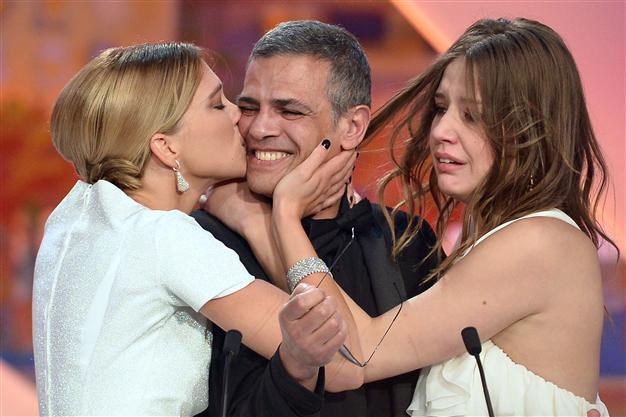Audacious lesbian love epic by French-Tunisian director wins the Palme d'Or
CANNES - Agence France-Presse

French actress Lea Seydoux (L) kisses French-Tunisian director Abdellatif Kechiche (C) next to actress Adele Exarchopoulos after he was awarded on May 26, with the Palme d'Or for the film 'Blue is the Warmest Colour' during the closing ceremony of the 66th Cannes film festival in Cannes. AFP photo
An audacious and passionate lesbian love story featuring non-simulated sex scenes, "Blue is the Warmest Colour" by French-Tunisian director Abdellatif Kechiche, won the top prize May 26 at the Cannes Film Festival in a watershed year for gay rights.An all-star jury at cinema's top showcase led this year by Hollywood director Steven Spielberg crowned the graphically erotic coming-of-age story set in France and clocking in at an epic three hours.
In an unusual step, Spielberg awarded the prize to Kechiche and the film's two stars, Adèle Exarchopoulos and Lea Seydoux, who joined him on stage to cheers and calls of "bravo" from the ceremony's audience. "I should like to dedicate this film to the wonderful youth of France whom I met during the long period while making this film," he said.
"Those young people taught me a lot about the spirit of freedom and living together." The Tunis-born Kechiche, 52, also hailed the spirit of the Arab Spring as he claimed his gong.
"I would also like to dedicate this film to other youth, something which happened not so very long ago, the revolution in Tunisia," he said. "They also have this aspiration to live free, to express themselves freely and to love in full freedom." The runner-up award, the Grand Prix, went to Joel and Ethan Coen's "Inside Llewyn Davis" starring Carey Mulligan, Justin Timberlake and newcomer Oscar Isaac in the title role, which delighted audiences with a mix of soulful 1960s folk singing and absurdist humour.
The Coens' film "Barton Fink" won Cannes in 1991 and the brothers last entered the running in 2007 with "No Country for Old Men".
Mexico's Amat Escalante won the best director prize for the ultra-violent "Heli" about his country's blood-drenched drug wars.
The 34-year-old filmmaker showed a family trapped in a vicious circle of crime and revenge, with torture scenes that left some queasy viewers running for the exits.
Bérénice Béjo 'Best actress'
French actress Bérénice Béjo claimed best actress honours for her role as a harried Parisian mother in Iranian Oscar winner Asghar Farhadi's patchwork family drama "The Past".
Béjo, who made her name in the hit French silent movie "The Artist", plays a wife who asks her estranged husband to return from Iran to finalise their divorce.
One of the stars of Hollywood's 1970s golden age, Bruce Dern, took the best actor prize for his performance in Alexander Payne's "Nebraska".
In the recession-era road movie, the 76-year-old Dern plays an alcoholic father who believes he has won a million-dollar sweepstake.
China's Jia Zhangke won the best screenplay prize for "A Touch of Sin", which offered a shocking look at rampant corruption in his country and exploitation of downtrodden citizens, who can only respond with violent rage.
"Blue" emerged as a favourite for the prize immediately after its premiere. It traces lead character Adele's infatuation with a beautiful blue-haired art student played by rising star Lea Seydoux, while also exploring themes such as class in France and women's careers.
"Sure to raise eyebrows with its show-stopping scenes of non-simulated female copulation, the film is actually much more than that: it's a passionate, poignantly handled love story," a Hollywood Reporter critic said.
"Remarkably, though, the explicit scenes never really feel pornographic, especially since the film isn't about titillation or arousal." The award came on the day of a major demonstration in Paris against a new law making France the 14th country to legalise same-sex marriage.
In a year in which gay themes resonated on and off screen, Steven Soderbergh's made-for-TV biopic of celebrity pianist Liberace and his long-time lover, "Behind the Candelabra", also drew praise for its A-list stars Michael Douglas and Matt Damon.
















